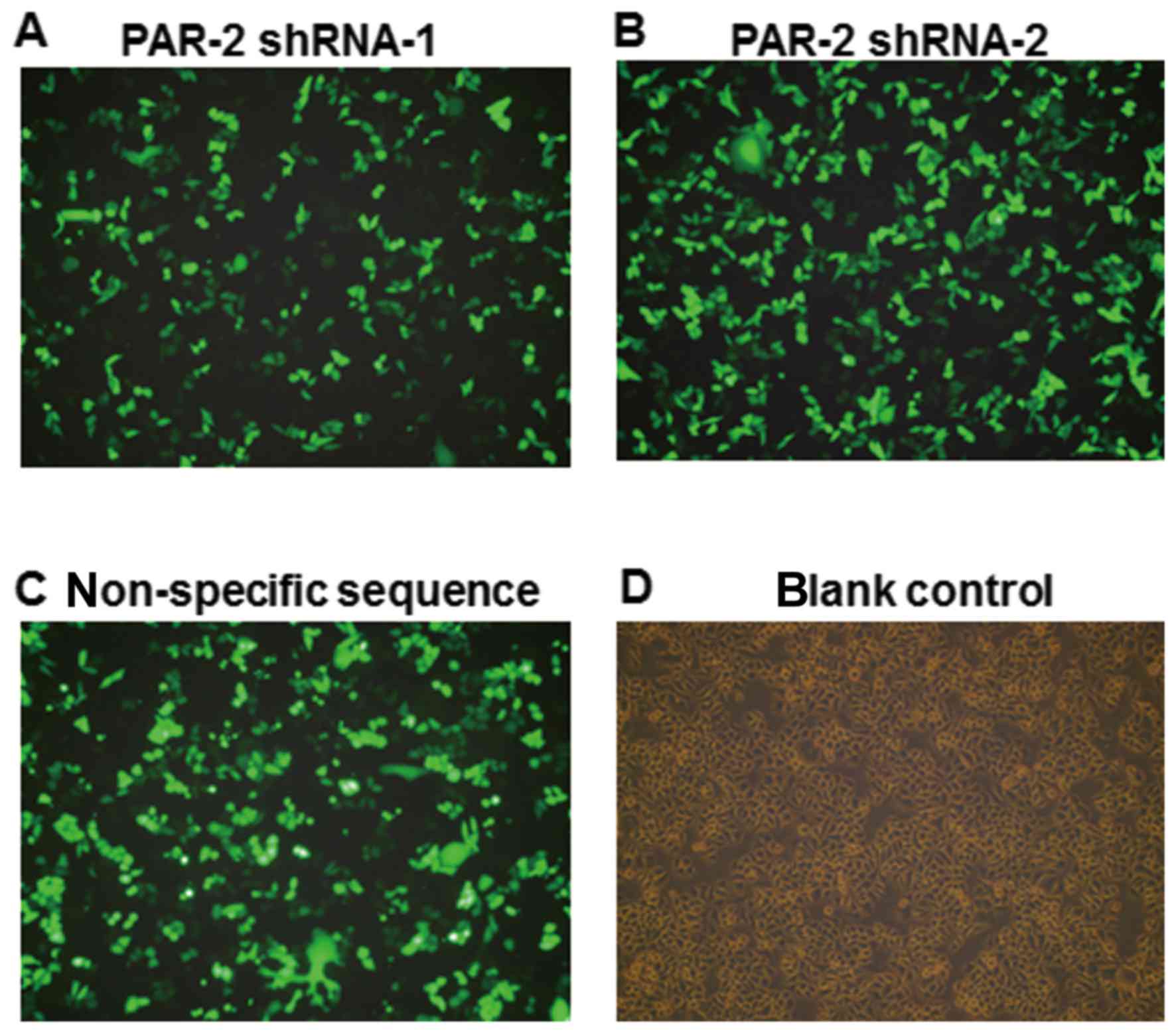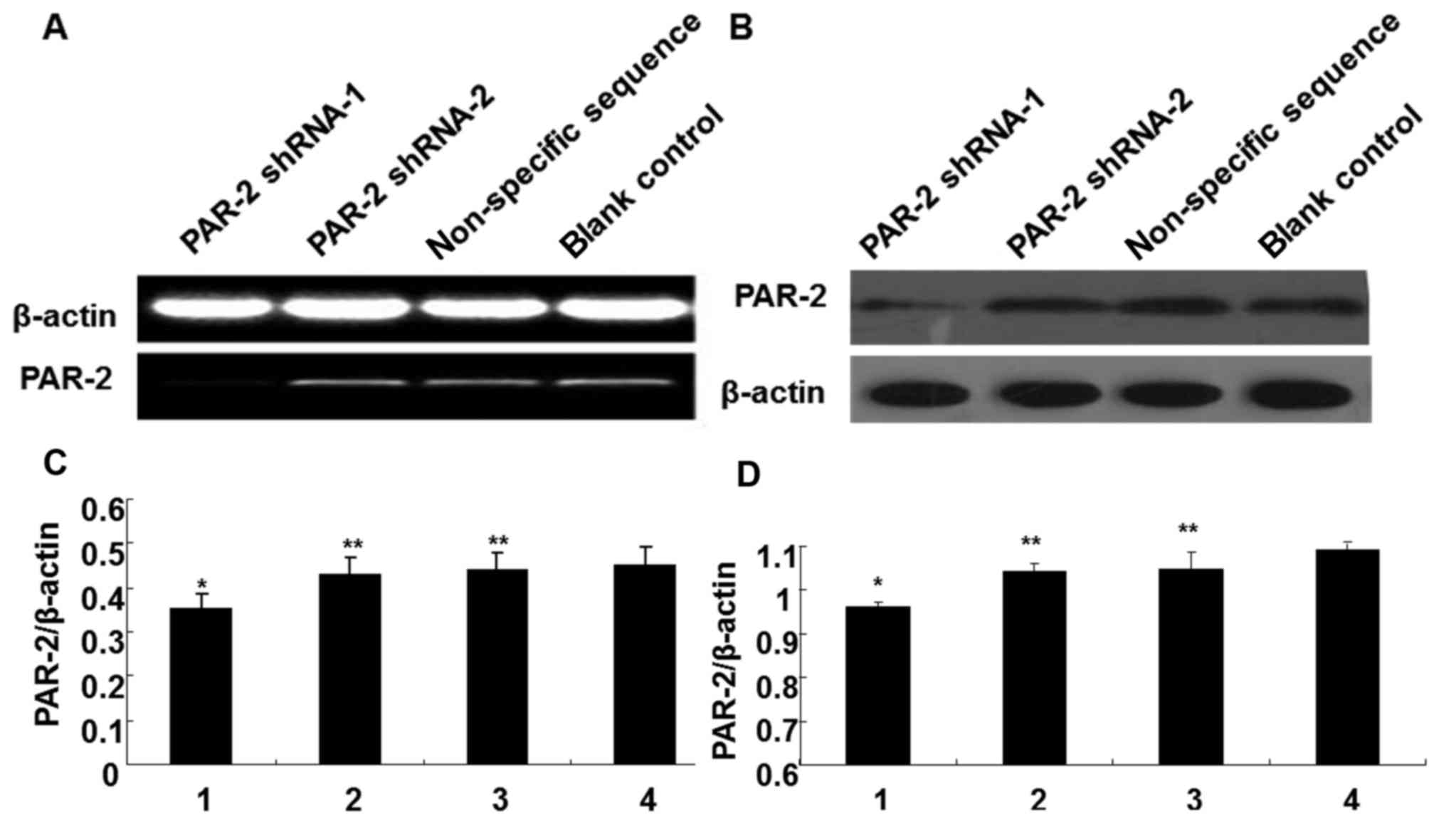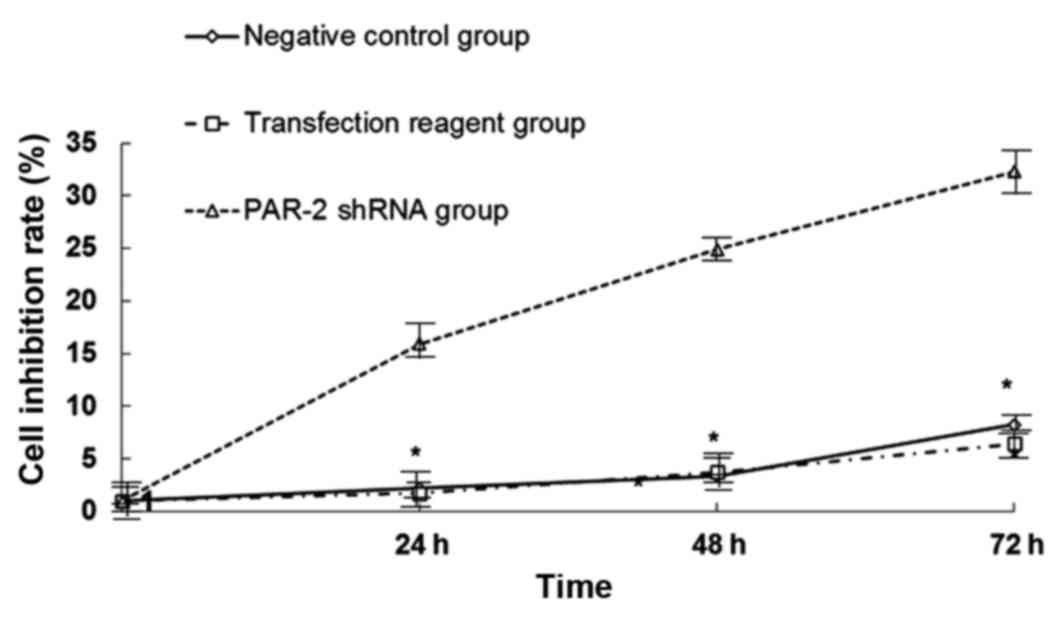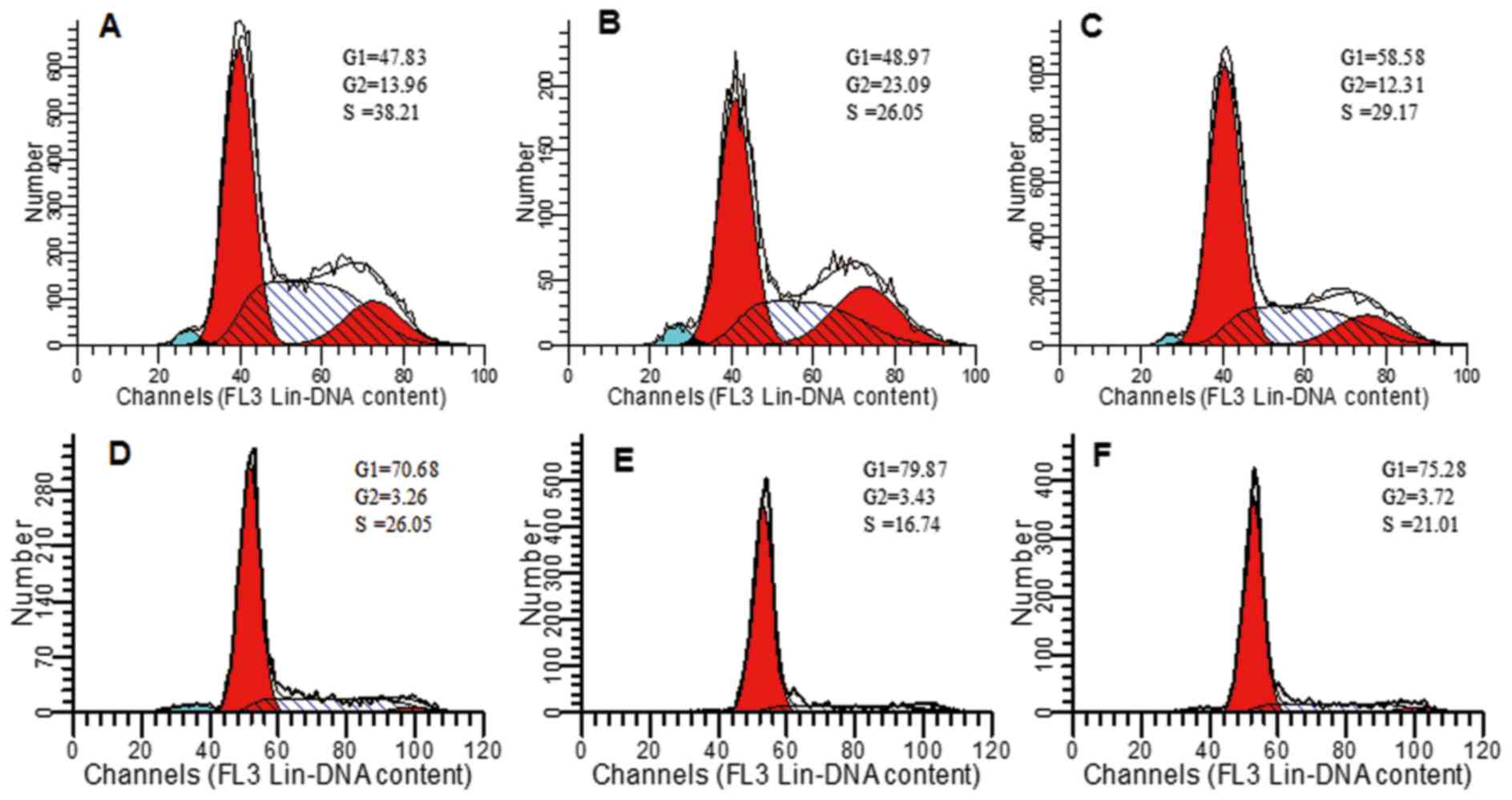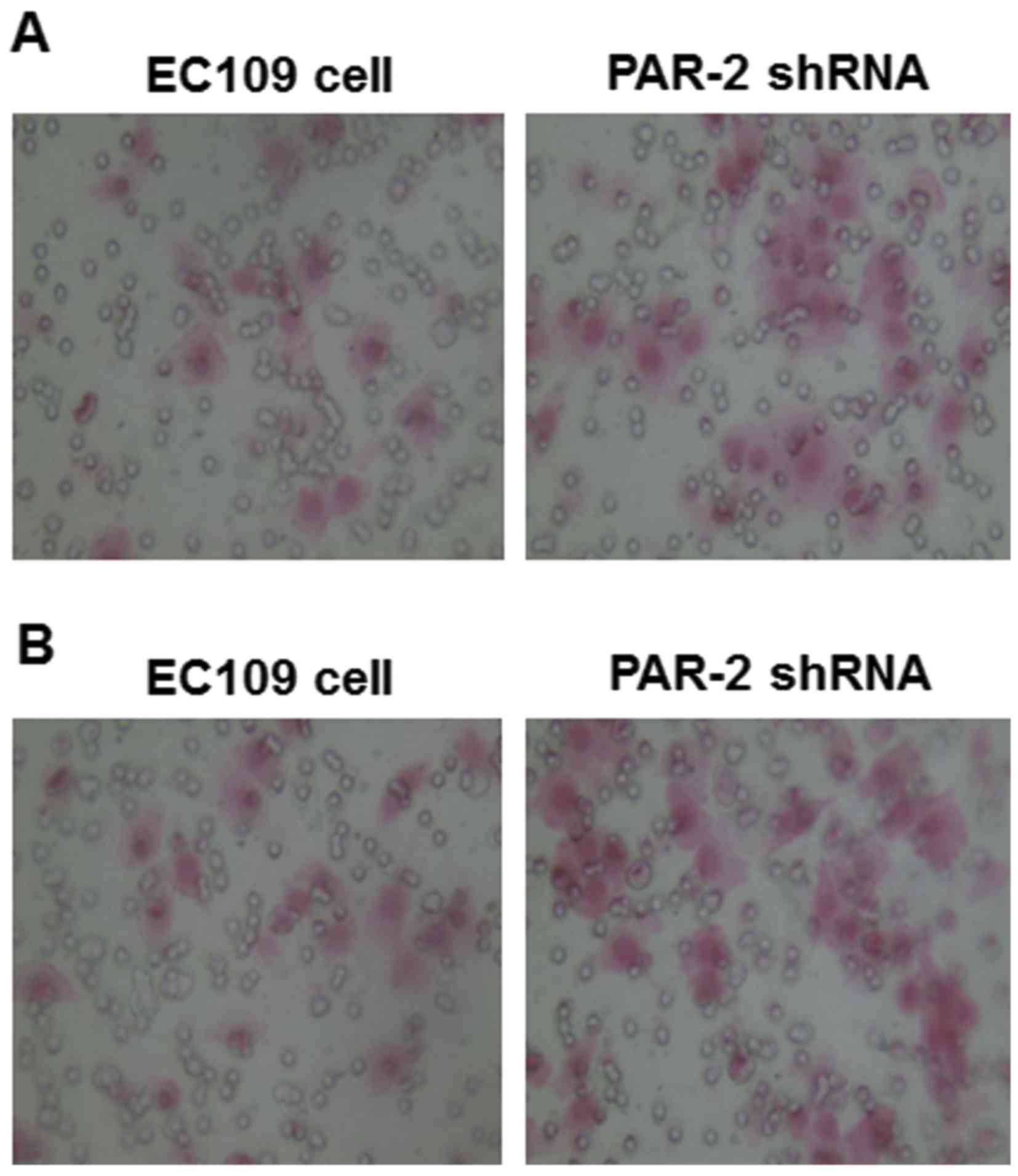|
1
|
Montgomery EA: Oesophageal cancerWorld
Cancer Report 2014. Stewart BW and Wild CP: IARC; Lyon: pp.
374–382. 2014
|
|
2
|
Hao J and Shao K: The epidemiology,
current status of management, challenge and future strategy for
esophageal cancer. Chin Oncol. 21:501–504. 2011.
|
|
3
|
Ciocirlan M, Lapalus MG, Hervieu V,
Souquet JC, Napoléon B, Scoazec JY, Lefort C, Saurin JC and Ponchon
T: Endoscopic mucosal resection for squamous premalignant and early
malignant lesions of the esophagus. Endoscopy. 39:24–29. 2007.
View Article : Google Scholar : PubMed/NCBI
|
|
4
|
Kim T, Grobmyer SR, Smith R, Ben-David K,
Ang D, Vogel SB and Hochwald SN: Esophageal cancer-the five year
survivors. J Surg Oncol. 103:179–183. 2011. View Article : Google Scholar : PubMed/NCBI
|
|
5
|
Ossovskaya VS and Bunnett NW:
Protease-activated receptors: Contribution to physiology and
disease. Physiol Rev. 84:579–621. 2004. View Article : Google Scholar : PubMed/NCBI
|
|
6
|
Caruso R, Pallone F, Fina D, Gioia V,
Peluso I, Caprioli F, Stolfi C, Perfetti A, Spagnoli LG, Palmieri
G, et al: Protease-activated receptor-2 activation in gastric
cancer cells promotes epidermal growth factor receptor
transactivation and proliferation. Am J Pathol. 169:268–278. 2006.
View Article : Google Scholar : PubMed/NCBI
|
|
7
|
Shimamoto R, Sawada T, Uchima Y, Inoue M,
Kimura K, Yamashita Y, Yamada N, Nishihara T, Ohira M and Hirakawa
K: A role for protease-activated receptor-2 in pancreatic cancer
cell proliferation. Int J Oncol. 24:1401–1406. 2004.PubMed/NCBI
|
|
8
|
Zhou J, Xie LQ, Li X, Chen X, Chen L,
Zheng Y and Li F: Protease-activated receptor-2 agonists promote
cell invasion and metastasis in human esophageal cancer cell line
EC109. World Chin J Digestol. 13:1313–1319. 2010.(In Chinese).
|
|
9
|
Macfarlane SR, Seatter MJ, Kanke T, Hunter
GD and Plevin R: Proteinase-activated receptors. Pharmacol Rev.
53:245–282. 2001.PubMed/NCBI
|
|
10
|
Nystedt S, Emilsson K, Wahlestedt C and
Sundelin J: Molecular cloning of a potential proteinase activated
receptor. Proc Natl Acad Sci USA. 91:9208–9212. 1994. View Article : Google Scholar : PubMed/NCBI
|
|
11
|
Inci K, Edebo A, Olbe L and Casselbrant A:
Expression of protease-activated-receptor 2 (PAR-2) in human
esophageal mucosa. Scand J Gastroenterol. 44:664–671. 2009.
View Article : Google Scholar : PubMed/NCBI
|
|
12
|
Uchima Y, Sawada T and Hirakawa K: Action
of antiproteases on pancreatic cancer cells. JOP. 8:(4 Suppl).
S479–S487. 2007.
|
|
13
|
Uusitalo-Jarvinen H, Kurokawa T, Mueller
BM, Andrade-Gordon P, Friedlander M and Ruf W: Role of protease
activated receptor 1 and 2 signaling in hypoxia induced
angiogenesis. Arterioscler Thromb Vasc Biol. 27:1456–1462. 2007.
View Article : Google Scholar : PubMed/NCBI
|
|
14
|
Awasthi V, Mandal SK, Papanna V, Rao LV
and Pendurthi UR: Modulation of tissue factor VIIa signaling by
lipid rafts and caveolae. Arterioscler Thromb Vasc Biol.
27:1447–1455. 2007. View Article : Google Scholar : PubMed/NCBI
|
|
15
|
Fujimoto D, Hirono Y, Goi T, Katayama K,
Hirose K and Yamaguchi A: Expression of protease activated
receptor-2 (PAR-2) in gastric cancer. J Surg Oncol. 93:139–144.
2006. View Article : Google Scholar : PubMed/NCBI
|
|
16
|
Ribeiro FS, Simão TA, Amoêdo ND, Andreollo
NA, Lopes LR, Acatauassu R, Rumjanek FD, Albano RM, Pinto LF and
Monteiro RQ: Evidence for increased expression of tissue factor and
protease-activated receptor-1 in human esophageal cancer. Oncol
Rep. 21:1599–1604. 2009.PubMed/NCBI
|
|
17
|
Hannon GJ: RNA interference. Nature.
418:244–251. 2002. View
Article : Google Scholar : PubMed/NCBI
|
|
18
|
Brusselmans K, De Schrijver E, Verhoeven G
and Swinnen JV: RNA interference-mediated silencing of the
acetyl-CoA-carboxylase-alpha gene induces growth inhibition and
apoptosis of prostate cancer cells. Cancer Res. 65:6719–6725. 2005.
View Article : Google Scholar : PubMed/NCBI
|
|
19
|
Filipowicz W: RNAI: The nuts and bolts of
the RISC machine. Cell. 122:17–20. 2005. View Article : Google Scholar : PubMed/NCBI
|
|
20
|
Mette MF, Aufsatz W, Kanno T, Daxinger L,
Rovina P, Matzke M and Matzke AJ: Analysis of double-strand RNA and
small RNAs involved in RNA-mediated transcriptional gene silencing.
Methods Mol Biol. 309:61–82. 2005.PubMed/NCBI
|
|
21
|
Zhang H, Zheng X, Chen K, et al: SiRNA
inhibit the expression of VEGF-C in patients with esophageal
carcinoma. Cancer Res Prev Treatment. 37:132–135. 2010.(In
Chinese).
|
|
22
|
Zheng YM, Xie LQ, Zhao JY, Li X, Chen XY,
Chen L, Hai O and Zhou J: Effects of proteinase activated
receptor-2 agonists on proliferation of hepatoma cells. Zhonghua
Gan Zang Bing Za Zhi. 17:701–702. 2009.(In Chinese). PubMed/NCBI
|
|
23
|
Zeng ZS, Shu WP, Cohen AM and Guillem JG:
Matrix metalloproteinase-7 expression in colorectal cancer liver
metastases: Evidence for involvement of MMP-7 activation in human
cancer metastases. Clin Cancer Res. 8:144–148. 2002.PubMed/NCBI
|
|
24
|
Caruso R, Pallone F, Fina D, Gioia V,
Peluso I, Caprioli F, Stolfi C, Perfetti A, Spagnoli LG, Palmieri
G, et al: Protease-activated receptor-2 activation in gastric
cancer cells promotes epidermal growth factor receptor
trans-activation and proliferation. Am J Pathol. 169:268–278. 2006.
View Article : Google Scholar : PubMed/NCBI
|
|
25
|
Darmoul D, Gratio V, Devaud H and Laburthe
M: Protease-activated receptor 2 in colon cancer: Trypsin-induced
MAPK phosphorylation and cell proliferation are mediated by
epidermal growth factor receptor transactivation. J Biol Chem.
279:20927–20934. 2004. View Article : Google Scholar : PubMed/NCBI
|















